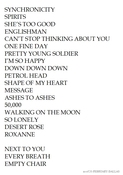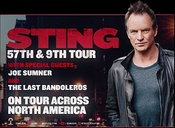
57th & 9th
Sting proved he's still making relevant music (and is still a sex symbol) at Dallas concert...
Now that he's turned 65, Sting was sounding a bit nostalgic Monday night after he played "Message in a Bottle," perhaps his greatest song with The Police.
"Forty years ago when I wrote this, only a dog was listening - and he was barely wagging his tail," he told about 5,000 fans at Verizon Theatre. "Forty years later, everyone in Dallas is singing all the words."
The former schoolteacher known as Gordon Sumner has indeed traveled light years since the 1970s, though he certainly doesn't look it. Chalk it up to yoga, barbells or the miracle of hair restoration surgery -- whatever the reason, Sting remains the everlasting sex symbol of the thinking woman.
More importantly, he's still making valid music. The half-dozen new songs he played from his album 57th & 9th stacked up nicely next to the classics: "I Can't Stop Thinking About You" is his best power-pop tune in decades, and the global-warming themed "One Fine Day" and "Petrol Head" remind you he's a master at writing message songs that don't sound like message songs.
Sting divvied up the show evenly between new tunes, Police songs and gems from past solo albums, including the Arabic rocker "Desert Rose" and "Englishman in New York," his '87 tune about gay writer Quentin Crisp that now sums up the struggle of "aliens" in the Trump era. "It takes a man to suffer ignorance and smile," Sting sang. "Be yourself no matter what they say."
Never content to merely crank out the hits, Sting re-arranged a lot of his older tunes - though not always for the better in the case of a hyper-reggae spin version of his country tune "I'm So Happy I Can't Stop Crying" and a purposely off-kilter "Walking on the Moon." But he managed to breathe new life into other Police hits, especially "Roxanne," which zig-zagged perfectly into Bill Withers' "Ain't No Sunshine."
The set-closing "Roxanne" finally got fans off their rumps and on their feet. But the crowd's mellow mood wasn't due to a lack of energy from Sting or his band.
The father-and-son guitar team of Dominic and Rufus Miller fleshed out songs with a lively mix of jazz, flamenco and hard-rock while Sting's son Joe Sumner and members of the Last Bandoleros sang backup. The band's star, however, was Josh Freese, a hard-hitting drummer best known for playing with Guns N' Roses and Nine Inch Nails. Pummeling his way through Police rockers like "So Lonely" and "Next To You," Freese gave the show an edge that recalled Sting's first solo tour with Branford Marsalis.
Sting anchored the band with his vibrant-but-subdued bass playing, the most under-rated component of his career. But the real revelation was his voice, which is almost as agile today as it was in his earlier days.
Back then, Sting seemed like an old soul trapped in a young man's body. Today, he's the opposite - rock's elder statesman, still sounding like a virile punk in his 20s.
(c) Dallas Morning News by Thor Christensen
Is Sting the most laid-back rock star on the planet?
If you caught his show at the Verizon Theatre the other night, the most recent stop on his 57th & 9th Tour, that was one of the biggest takeaways. The 65-year old walked onstage with barely a spotlight shining on him as he waved to a crowd and sat down in the middle of the stage, guitar in hand.
“It’s good to be back, the first time I came to Dallas was in 1979 at The Palladium,” Sting said. “I must’ve been about 12!”
And while Sting made it clear he was only warming us up with a tune before the opening acts, he had the crowd in the palm of his hands when he launched into “Heading South on the Great North Road.” The melancholic tune may not have quite set the tone for the loud and rollicking night of music that was to come, but it was the perfect introduction to Sting the storyteller.
Anyone who doesn’t believe talent is hereditary hasn’t seen Joe Sumner, Sting’s son. He bears such a striking resemblance to his father with a voice to match that I had to check a few times to make sure it wasn’t Sting himself. While his music’s more on the folk side, the similarities between the two are decidedly eerie.
After The Last Bandoleros opened up the house with their country-leaning set, Sting came onstage to the sounds of The Police’s “Synchronicity II.” Rocking a simple black t-shirt and charming grin, the crowd filled the air with brightly-lit smartphones and rapturous applause.
With the two opening acts a part of the backing band, Sting set forth on a night that was a celebration of his days with The Police and equally impactful solo career.
The tour is in support of Sting’s most recent album, last November’s stellar 57th & 9th, so the set list was unsurprisingly packed with cuts from it. While some fans may groan at artists who focus on their newer material instead of the work that made them famous, Sting gave his all to every single song regardless of whether or not you knew the words.
While I was familiar with 57th & 9th going into the show, Sting’s emotive tenor brought them to vibrant, beautiful life. “One Fine Day” and “Down, Down, Down” were particularly stunning, but it was his encore performance of “The Empty Chair” that brought the house to tears.
Sting may be best known for his contributions to The Police, but his solo efforts have stood the test of time on their own merits. Along with being an electric performer, Sting truly is one of the greatest songwriters alive. “Englishman In New York” and “Shape of My Heart” may be more low-tempo songs, but seeing them live gives you a new appreciation for how expertly crafted they are.
But when he busted into his discography of hits and undeniable classics, Sting and the crowd lit up in a way that only music has the power to produce. The Police are one of the greatest groups to come out of the ‘80s (or any other decade for that matter), and their music still holds up as a shining example of the pure pleasures of New Wave.
“Sprits in the Material World” and “Walking on the Moon” may not be the most popular Police songs, but you wouldn’t know that looking at the way the crowd hung on to every word. “Message In A Bottle” was delivered with fire and a breakdown near the end that lingered on Sting’s heavenly vocals. And I don’t even know how to express the euphoria the crowd underwent when Sting launched into Bill Wither’s “Ain’t No Sunshine” before segueing into “Roxanne” (with red lights flashing on the stage, of course).
The crowd was so amped up by the time Sting stepped offstage that the demand for an encore was immediately. We liked when he sang The Police’s 1978 “Next To You,” but lost our minds when he finished up with their signature hit: “Every Breath You Take.”
Egos tend to run rampant in rock music, but Sting is the definition of a gentleman. He didn’t take himself too seriously during the two-and-a-half-hour show and brushed off some minor technical glitches with a shrug. He always made sure to express his gratitude to the sold-out crowd and balanced the potent emotion of his music with a sort of goofy charm sorely missing from most arena shows.
Sting’s proven himself as one of rock’s most enduring icons, and his show Monday night demonstrated why. Between his charismatic stage presence and knack for musical storytelling, there’s simply no one else like him.
(c) Red Dirt Report by Keaton Bell



